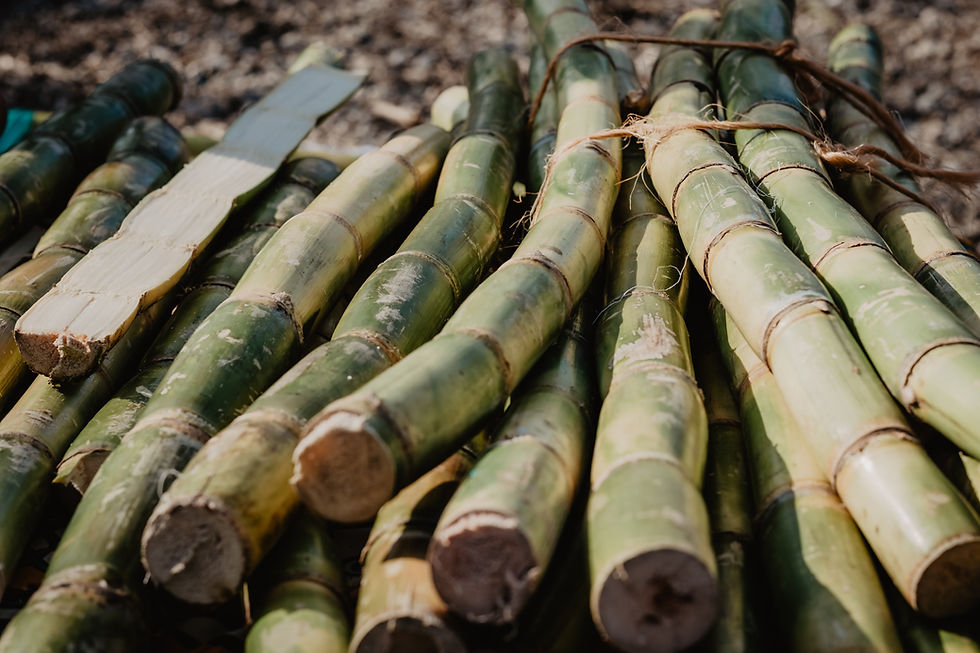SEASON 2.4: WHEAT
- SOURCED
- Dec 1, 2021
- 3 min read
Updated: Dec 2, 2021

The history of wheat is one that is linked so closely to many shifts in human food systems. In broad strokes it is the cultivation of wild grasses, which happened over 10,000 in the region named ‘the Fertile Crescent’ a curved strip that covers modern day Iraq, Israel, Syria, Jordan, Lebanon, Egypt and others depending on who you speak to, and how you understand the space - it is a fluid space. Its positioning near three main rivers - the Nile, Tigris, Euphraties - meant that this area was able to be irrigated and the soil was fertile.
Throughout history wheat has continued to be a focal point of production and farming. It has driven business, been a violent part of colonial expansion, and become a dominant feature in global diets. But wheat also has diverse histories and ways of consumption, and holds place in traditional cooking across many cultures.
Currently there is a lot of work being done across the world to preserve ancient grains (such as in seed banks and grass root organisation), to cultivate strains to be resident to drought with the changing climate, and looking at wheat as potential to change farming systems.
The system of wheat is wide and its production feeds into so much of our food chain, that to untangle it’s influence is a project in itself. With that in mind, it might seem illogical this is going to be our shortest season but we have decided to keep it concise and treat this as a beginning exploration to pick up again at a future period. We have also chosen to focus on this season in a much more literal sense than we have in past seasons and focused on wheat as very much an ingredient in foods.
Those who receive our paid newsletter will get wheat focused reading lists (to be added to this list at the end of the season) as we also dive into this topic of wheat. Wheat is big business and it is crucial that when we do our reading we also keep in mind the complex issues around labour, food accessibility at the end of the chain, and the power business holds within this space. But we also want to find how and where the cultural connections with wheat come in! Therefore I hope you will enjoy the next journey with us in our reading and research, and of course the incredible work we have commissioned to explore these ideas further.
Reading List - will be updated as the season goes
Books - non-fiction
Bread & Butter: history, culture, recipes. This book is only a few years old but feel seminal. Written by Richard Snapes (baker), Grant Harrington (butter maker) and Even Hemmingway (writer) it gets to heart of where bread and butter have featured in history and now and looks to ideas of sustainability and making good food.
Carbs, by Laura Goodman. This is a very fun and cool book; covers all things carbs, not just wheat related things. Great stories and accessible recipes which grounds the idea of how we eat as cultural.
The handmade loaf, by Dan Lepard. Everything Dan does is thoughtful and considered. This book is a great entry into making bread and is about "making the most of what you have"
The Art of Fermentation, by Sandor Elix Katz. Wheat often gets fermented - beer! - so we are adding this in as it will also lead into other seasons... There is also specific sections - Fermenting Grains, and Fermenting Beers and Other Grain-based Alcoholic Beverages - that are more directly related to wheat.
Books - fiction
A Grain of Wheat by Ngugi wa Thiong'o. Set in 1963 in Kenya, this book is a story about colonialism and the ideas of national independence, and land ownership and power.
Chapters (as always, let us know if you'd like us to scan the chapters and send!)
'A cry for bread' in Stuffed & Starved: from farm to fork, the hidden battle for the world food system, by Raj Patel. It is not surprising if a chapter of this book ends up in every season, it so fundamental in understanding modern food systems. This chapter looks at the idea of luxury and necessity.
'Feeding the giants' in Food: a history by Felipe Fernandez-Armesto. Wheat features a lot in this book, but this chapter looks at the 19th and 20th century and how food got revolutionised. 'Challenging evolution' looks at the impact of colonialism on ingredients such as wheat, and it's introduction to places like the Americas
Articles
Projects
Newsletters
Andrew Janjigian's newsletter - a fun (often) bitesize info on bread and things related
Follow Andrew, he's great! And this gift guide is also a great reading list!










